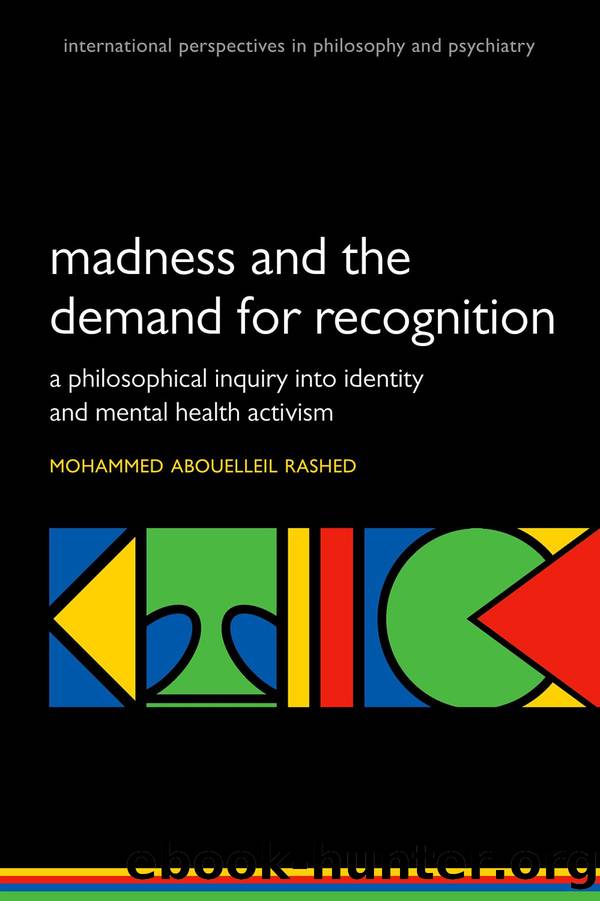Madness and the Demand for Recognition by Mohammed Abouelleil Rashed;

Author:Mohammed Abouelleil Rashed;
Language: eng
Format: epub
Publisher: Oxford University Press USA
Published: 2019-06-15T00:00:00+00:00
5.5 Responding to misrecognition: A role for political reform and reconciliation
We have seen that an adequate response to demands for recognition requires both political reform and interpersonal reconciliation. The latter is the ultimate goal in that it focuses on the âinternalâ change that needs to occur by way of repairing social relationships. But the complexities in arriving there create room for the facilitating activities of political institutions. On the other hand, coercive political reforms in the absence of reconciliation can be counterproductive.
Let us begin by considering what a coercive political response to misrecognition might look like. We could have, for example, legislation that bans the use of words and narratives considered offensive to certain groups in society. This is already the case in relation to racial slurs and other expressions that fall under hate speech laws or similar legislation. The equivalent in the case of Mad activism (hypothetically) would be to criminalize or discourage the use of terms such as âpsychoticâ or âschizophrenicâ (coterminous with this would be educational campaigns aimed at changing the terms of the public conversation). Coercive reforms can be considered a step forward in the same way that hate speech laws discourage some people from partaking in racist abuse of others. But there is also no doubt that coercive reforms of this kind are insufficient; on the one hand, they may breed resentment among those citizens who take such reforms as an attack on their right to free speech; on the other hand, they may create the illusion of a solution without actually having an effect on the contexts in which people interact, the contexts in which recognition and misrecognition are daily realities. It is difficult to force people to accept each other, and political reform without reconciliation is insufficient.
That being said, an attitude of reconciliation can be encouraged through political action. For example, the South African government passed the Promotion of National Unity and Reconciliation Act in 1995, upon which the Truth and Reconciliation Commission (TRC) of post-apartheid South Africa was able to commence its work.17 Methodologically, a key approach of the TRC was to get people to hear each otherâs stories over thousands of encounters. In these encounters, people confronted each other, giving mutual testimonies and describing what they had done and what was done to them. It placed people in a context where they could meet with the explicit intention of reconciliation and forgiveness. In a more general sense, an attitude of societal reconciliation can be primed in a positive direction by prior work to address dehumanizing social narratives pertaining to specific groups in society. Further, the extension of certain rights to groups previously denied them can also increase the chances of reconciliation. We have seen this, to a certain extent, following same-sex marriage legalization in England. Political activity that gets people to share testimonies, or promotes equal rights, or advances positive views of devalued and despised identities, may foster a social attitude of reconciliation toward those individuals.
There is much that can be
Download
This site does not store any files on its server. We only index and link to content provided by other sites. Please contact the content providers to delete copyright contents if any and email us, we'll remove relevant links or contents immediately.
Human Diseases (MindTap Course List) (by Team-IRA) by Marianne Neighbors Ruth Tannehill-Jones(909)
Cancer Cell Culture by Unknown(456)
The Neglected Dimension of Global Security: A Framework to Counter Infectious Disease Crises by National Academy of Medicine Secretariat(449)
Imaging in Urology by Mitchell Tublin MD Joel B Nelson MD(432)
Statistical Methods in Health Disparity Research by J. Sunil Rao(431)
Health Behavior: Theory, Research, and Practice by Karen Glanz & Barbara K. Rimer & K. Viswanath(390)
Achieving Procreation : Childlessness and IVF in Turkey by Merve Demircioğlu Göknar(382)
Short Course in Medical Terminology by Nath Judi L.;(353)
Wilkins' Clinical Practice of the Dental Hygienist by Boyd Linda D.;Mallonee Lisa F.; & Lisa F. Mallonee(327)
Clinical Research in Occupational Therapy, Sixth Edition by Martin Rice;(323)
Murray's Basic Medical Microbiology E-Book by Murray Patrick R.;(305)
Anatomical Kinesiology by Gross Michael;(305)
Neuroscience Fundamentals for Rehabilitation by Lundy-Ekman Laurie(304)
Psychedelics As Psychiatric Medications by Nutt David;Castle David;(292)
The Human Central Nervous System by Unknown(287)
A Pocket Guide for Medical Students: From Enrollment to Job Interviews by Sarah Cuschieri(284)
Rang & Dale's Pharmacology 9th Edition plus Flashcards 2nd Edition by Unknown(282)
The Handbook of Medicinal Chemistry by Simon E Ward;Andrew Davis;(265)
Public Health and Society: Current Issues by Burke Lillian D.;Weill Barbara;(264)
